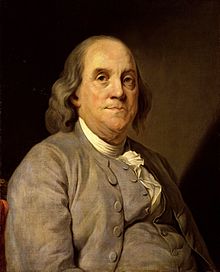
Back Франклин, Бенџьамин Abkhazian Benjamin Franklin Afrikaans Benjamin Franklin ALS ቤንጃሚን ፍራንክሊን Amharic Benjamin Franklin AN بنجامين فرانكلين Arabic بينچامين فرانكلين ARZ বেঞ্জামিন ফ্ৰেংকলিন Assamese Benjamin Franklin AST Benjamin Franklin Aymara
Benjamin Franklin | |
|---|---|
 | |
| 6th President of Pennsylvania | |
| In office October 18, 1785 – November 5, 1788 | |
| Vice President | Charles Biddle Thomas Mifflin |
| Preceded by | John Dickinson |
| Succeeded by | Thomas Mifflin |
| United States Minister to France | |
| In office September 14, 1778 – May 17, 1785 | |
| Appointed by | Continental Congress |
| Preceded by | New office |
| Succeeded by | Thomas Jefferson |
| United States Minister to Sweden | |
| In office September 28, 1782 – April 3, 1783 | |
| Appointed by | Congress of the Confederation |
| Preceded by | New office |
| Succeeded by | Jonathan Russell |
| 1st United States Postmaster General | |
| In office July 26, 1775 – November 7, 1776 | |
| Appointed by | Continental Congress |
| Preceded by | New office |
| Succeeded by | Richard Bache |
| Speaker of the Pennsylvania Assembly | |
| In office May 1764 – October 1764 | |
| Preceded by | Isaac Norris |
| Succeeded by | Isaac Norris |
| Member of the Pennsylvania Assembly | |
| In office 1762–1764 | |
| In office 1751–1757 | |
| Personal details | |
| Born | January 17, 1706 Boston, Massachusetts Bay |
| Died | April 17, 1790 (aged 84) Philadelphia, Pennsylvania |
| Nationality | American |
| Political party | Independent |
| Spouse(s) | Deborah Read |
| Children | William Franklin Francis Folger Franklin Sarah Franklin Bache |
| Profession | Scientist Writer Politician |
| Signature |  |
Benjamin Franklin (January 17, 1706 – April 17, 1790) was an American Founding Father, and scientist. He has also been known as "the First American". He was a very important person in the American Revolution and helped make the Thirteen Colonies one nation. As a leader of the Enlightenment, he influenced European scientists. He even was the first thing many Europeans associated with America at the time. His successful diplomacy in France was an important factor in the United States' win over Great Britain.